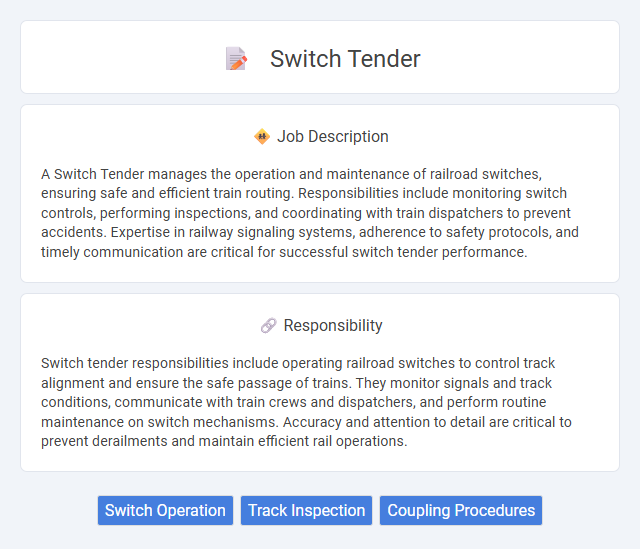
A Switch Tender manages the operation and maintenance of railroad switches, ensuring safe and efficient train routing. Responsibilities include monitoring switch controls, performing inspections, and coordinating with train dispatchers to prevent accidents. Expertise in railway signaling systems, adherence to safety protocols, and timely communication are critical for successful switch tender performance.
Switch tender jobs likely require individuals who are detail-oriented, physically fit, and capable of working in outdoor environments with varying weather conditions. Those who thrive in structured, repetitive tasks and can maintain high levels of concentration under pressure may be well-suited for this role. However, individuals prone to fatigue or distractions might find the demands of monitoring and operating railway switches challenging.
Qualification
Switch tender job requires strong technical knowledge in railway signaling systems and electrical circuits. Candidates must possess a high school diploma or equivalent, with specialized training or certification in railway operations or maintenance preferred. Experience in switch machine operation, safety protocols, and mechanical troubleshooting is essential for ensuring efficient track switching and minimizing operational delays.
Responsibility
Switch tender responsibilities include operating railroad switches to control track alignment and ensure the safe passage of trains. They monitor signals and track conditions, communicate with train crews and dispatchers, and perform routine maintenance on switch mechanisms. Accuracy and attention to detail are critical to prevent derailments and maintain efficient rail operations.
Benefit
Switch tender jobs likely offer competitive salaries and comprehensive benefits packages, including health insurance and retirement plans. Employees may have access to paid time off and opportunities for overtime pay, increasing overall earnings. Job stability and potential for career advancement could also be probable benefits in this role.
Challenge
Switch tender jobs often present the challenge of managing complex railway track operations under strict safety protocols. The probability of encountering high-pressure situations increases due to the need for precise coordination and quick decision-making. As technology evolves, adapting to automated systems while maintaining manual oversight could become an ongoing challenge.
Career Advancement
Switch tender roles offer significant career advancement opportunities by providing hands-on experience in railway signal control and track switching operations. Mastery in this position can lead to supervisory roles or specialized technical jobs within railway operations, safety management, and infrastructure maintenance. Continuous skill development and certifications in railway systems enhance prospects for promotions and higher-paying positions in the transportation industry.
Key Terms
Switch Operation
Switch operation involves the efficient management and control of electrical switches within power distribution systems to ensure safe and reliable energy flow. Skilled switch operators coordinate the opening and closing of switches to isolate faults, perform maintenance, and balance load distribution, minimizing downtime and preventing equipment damage. Mastery of switch operation protocols and real-time monitoring systems is essential for maintaining grid stability and operational safety.
Track Inspection
Switch tender jobs involve maintaining and inspecting railway track switches to ensure safe train operations. Track inspection includes checking switch points, rails, and locking mechanisms for wear, alignment, and damage to prevent derailments. Regular inspections utilize specialized tools and technology to detect defects, supporting efficient maintenance and improved rail safety.
Coupling Procedures
Switch tender job involves precise coupling procedures ensuring train cars are securely connected to maintain safety and operational efficiency. Proper alignment, handbrake application, and locking of knuckle couplers prevent accidental uncoupling during transit. Consistent adherence to coupling protocols reduces mechanical failures and increases overall railway reliability.
 kuljobs.com
kuljobs.com